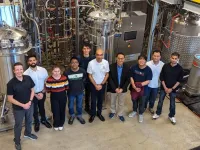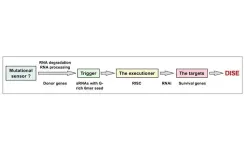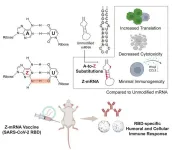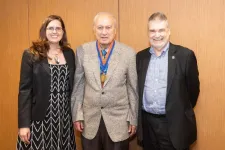(Press-News.org) Six adults with type 1 diabetes (T1D) treated with stem cell-derived islet cells (VX-880) have shown improved blood sugar control with three participants achieving insulin independence, according to new research being presented at this year’s Annual Meeting of The European Association for the Study of Diabetes (EASD), Hamburg (2-6 Oct).
All patients treated with VX-880 have demonstrated improved glycaemic control, as evidenced by elimination of severe hypoglycaemia (low blood sugar), improvements in HbA1c (a measure of long-term sugar levels) and the amount of time their blood glucose levels were within the recommended range, as well as a reduction or elimination of their externally administered insulin needs.
The phase 1/2 trial results presented by Professor Trevor Reichman from Toronto General Hospital in Canada are from a study evaluating VX-880 in adults with impaired hypoglycaemic awareness and a history of severe hypoglycaemic events, where patients are unable to sense the symptoms of low blood sugar and sugar levels that may drop so low that patients are unable to recover without assistance.
“These results are truly remarkable and offer hope of a life-changing therapy for people who suffer from the relentless life-long burden of type 1 diabetes”, says Professor Reichman, M.D., Department of Surgery, University of Toronto, Canada. “All patients who have been treated with VX-880 have shown improvement across all measures of glucose control, including reduction or even elimination of external insulin use.”
People with T1D don’t have functional cells in the pancreas to produce the body’s own insulin and require daily insulin injections or pumps to survive.
The ongoing trial is now in the final part of three. In Part A, two patients were enrolled sequentially and received half the target dose of VX-880; Patient 2 subsequently withdrew consent and discontinued participation in the trial for personal reasons, not related to an adverse event. In Part B, five patients were enrolled sequentially and received the target (full) dose. Parts A and B of the study have completed enrolment, and Part C, in which 10 patients will be enrolled concurrently and will receive the target dose, is well underway.
Here, researchers report on all patients in Parts A and B, all of whom have been followed up for more than 90 days.
Following a single infusion of VX-880, patients were monitored for safety and tolerability (assessed by adverse events and clinical laboratory assessments), fasting and stimulated C-peptide (an indicator that the patient is making insulin), multiple measures of blood glucose control, and external insulin use.
In Part A, following VX-880 infusion at half the target dose, Patient 1 achieved insulin independence after 9 months, which was sustained at the most recent visit at 24 months. This is a patient with a nearly 42-year history of living with severe T1D, who was using an average of 34 units of insulin per day prior to trial enrolment.
In Part B, following VX-880 infusion at the target (full) dose, Patient 3 achieved insulin independence after 6 months, which was sustained at the most recent 12-month visit. This patient had a 19-year history of living with T1D and needed an average of 45 units of insulin per day prior to trial enrolment. Patient 3 was started on four units of daily insulin after 15 months. Within the last few weeks, Patient 4 reached day 180 and achieved insulin independence. All patients experienced improvements in HbA1c and the amount of time their blood glucose levels were in the recommended range.
All six patients demonstrated improved glycaemic control, reduction in HbA1c and an increase in the amount of time their blood glucose levels were in the recommended range, as well as a reduction in or elimination of their external insulin needs and elimination of severe hypoglycaemia for more than 90 days.
At 90 days post-procedure, all six patients in Parts A and B responded to a mixed-meal tolerance test by triggering production of insulin, which is exactly what a functioning pancreas would do, suggesting that the injected islet cells were acting as intended.
VX-880 has been generally safe and well tolerated in all patients dosed to-date. The majority of adverse events (AEs) were mild or moderate, with two non-serious AEs related to VX-880; both were elevated transaminases (liver enzymes) that occurred shortly after VX-880 infusion, were transient and resolved. There were no serious AEs related to VX-880 treatment (see slide 10 in notes to editors for full details).
Despite the promising results, the new cells are at risk from the body’s own immune system, therefore, immunosuppressants are needed to help prevent rejection, which may bring their own risk.
“The future goal is to create a version of the treatment that does not require immunosuppressive therapy”, says Professor Reichman. “The makers of VX-880 are working on encapsulating the cells in a device that would allow them to evade the immune system as well as genetically modifying the cells so they won’t initiate an autoimmune attack.”
Notes to editors:
This work was supported by Vertex Pharmaceuticals Incorporated the makers of VX-880.
This press release is based on abstract 449 at The European Association for the Study of Diabetes (EASD). All accepted abstracts have been extensively peer reviewed by the congress selection committee. There is no full paper at this stage, but the authors are happy to answer your questions. The research has not yet been submitted to a medical journal for publication. As there has been substantial new data since the abstract was submitted, no abstract is provided – the latest data is within the slide presentation below.
END
New stem cell-derived islet therapy improves blood sugar control in all treated patients, with three achieving insulin independence
Phase 1/2 study indicates stem cell-derived therapy that is designed to replace destroyed beta cells with healthy transplanted insulin-producing cells may have potential to transform type 1 diabetes
2023-10-04
ELSE PRESS RELEASES FROM THIS DATE:
New pipeline makes valuable organic acid from plants — saving money and emissions
2023-10-03
In a breakthrough for environmentally friendly chemical production, researchers at the Center for Advanced Bioenergy and Bioproducts Innovation (CABBI) have developed an economical way to make succinic acid, an important industrial chemical, from sugarcane.
The team of University of Illinois and Princeton University researchers created a cost-effective, end-to-end pipeline for this valuable organic acid by engineering a tough, acid-tolerant yeast as the fermenting agent, avoiding costly steps in downstream processing. Succinic acid is a widely ...
PARMESAN: An AI-based predictive tool to find new treatments for genetic disorders
2023-10-03
To discover new treatments for genetic disorders, scientists need a thorough knowledge of prior literature to determine the best gene/protein targets and the most promising drugs to test. However, biomedical literature is growing at an explosive rate and often contains conflicting information, making it increasingly time-consuming for researchers to conduct a complete and thorough review.
To address this challenge, Cole Deisseroth, a graduate student enrolled in the M.D./Ph.D. program and mentored by Drs. Huda Zoghbi and Zhandong Liu at the Jan and Duncan ...
PPPL awarded $5 million to lead an Energy Earthshot Research Center focused on clean hydrogen
2023-10-03
Lessening the effects of climate change will require a variety of innovations and a lot of ingenuity. Now, a new center led by the U.S. Department of Energy’s (DOE) Princeton Plasma Physics Laboratory (PPPL) will help these efforts by advancing the understanding of plasma-based clean hydrogen production.
PPPL was selected to lead a DOE Energy Earthshot Research Center (EERC) as part of the Hydrogen Shot™, which aims to reduce the cost of hydrogen by 80%. With funding from the DOE’s Office of Science, the EERCs support fundamental ...
Illinois-led project to sequence 400 soybean genomes, improve future crops
2023-10-03
As a source of protein and biodiesel for cleaner renewable energy, soybean is an important crop worldwide. But is it performing to its full potential? An ambitious effort led by the University of Illinois Urbana-Champaign and the U.S. Department of Energy Joint Genome Institute (JGI) will sequence 400 soybean genomes to develop a “pangenome” — an attempt to characterize all the useful diversity in the genome to create an even more robust and resilient crop.
The soybean pangenome project will sequence and analyze at least 50 soybean genomes from cultivated lines and wild relatives at reference quality, the gold standard of modern sequencing. A further ...
An ancient anti-cancer mechanism: DISE
2023-10-03
“DISE is effective against all cancers we tested.”
A new editorial paper was published in Oncotarget's Volume 14 on September 25, 2023, entitled, “DISE, an ancient anti-cancer mechanism that senses mutational load in cancerous cells?”
In their new editorial, researchers Monal Patel and Marcus E. Peter from Northwestern University discuss a recent breakthrough in cancer therapy. Despite the multiple advances in therapy, cancer remains one of the most common causes of death globally. ...
Project aims to develop all-in-one semiconductor that stores, processes data
2023-10-03
A multi-institutional project led by a Penn State researcher is focused on developing an all-in-one semiconductor device that can both store data and perform computations. The project recently received $2 million in funding over three years as part of the new National Science Foundation Future of Semiconductors (FuSe) program, a $45.6 million investment to advance semiconductor technologies and manufacturing through 24 research and education projects across the United States.
“The goal of ...
Nemours Children’s Health hosts first-ever pediatric session at HLTH
2023-10-03
Nemours Children’s Health will host the first-ever dedicated pediatric session at HLTH, the leading platform bringing together the entire health ecosystem focused on health innovation and transformation. This invited program, “Elevating Kids Health Well Beyond Medicine,” will extend HLTH’s 2023 theme, “Elevating Humanity,” to focus on health in childhood and why it is the only way to build good health across the lifespan.
“The child health perspective is an essential viewpoint for the attendees of HLTH to consider and we are proud to offer ...
OU Engineering among top 28 teams nationwide selected for DEPSCoR Grant
2023-10-03
University of Oklahoma engineering researcher Reza Foudazi, Ph.D., has been selected to receive a $600,000 grant from the U.S. Department of Defense under the Defense Established Program to Stimulate Competitive Research, or DEPSCoR. The highly competitive grant was awarded to only 28 academic teams nationwide.
An associate professor in the School of Sustainable Chemical, Biological and Materials Engineering, Foudazi’s research centers on the exploration of electrochemical energy storage systems that incorporate multivalent ions. ...
From A to Z: An alternative base modification for mRNA therapeutics
2023-10-03
Messenger RNA (mRNA) technology has become popular in the last few years due to its use in COVID-19 vaccines. This technology has been so groundbreaking that it recently won the 2023 Nobel Prize in medicine “for discoveries concerning nucleoside base modifications that enabled the development of effective mRNA vaccines against COVID-19.” This isn’t new technology, however— modified mRNAs have been studied for decades and show significant potential for therapeutic applications. Compared to unmodified mRNAs, modified ...
Legendary UTA professor establishes endowed professorship in heat transfer
2023-10-03
Abdolhossein Haji-Sheikh, a retired professor in the Mechanical and Aerospace Engineering Department at The University of Texas at Arlington, has made a $500,000 gift to support his former department.
The gift creates an endowed professorship in heat transfer, one of Haji-Sheikh’s areas of expertise during his decades of teaching at UTA. The professorship will be awarded in 2026.
Haji-Sheikh began his career at what was then Arlington State College in 1966. He said he wants to give back to ...
LAST 30 PRESS RELEASES:
Ketamine high NOT related to treatment success for people with alcohol problems, study finds
1 in 6 Medicare beneficiaries depend on telehealth for key medical care
Maps can encourage home radon testing in the right settings
Exploring the link between hearing loss and cognitive decline
Machine learning tool can predict serious transplant complications months earlier
Prevalence of over-the-counter and prescription medication use in the US
US child mental health care need, unmet needs, and difficulty accessing services
Incidental rotator cuff abnormalities on magnetic resonance imaging
Sensing local fibers in pancreatic tumors, cancer cells ‘choose’ to either grow or tolerate treatment
Barriers to mental health care leave many children behind, new data cautions
Cancer and inflammation: immunologic interplay, translational advances, and clinical strategies
Bioactive polyphenolic compounds and in vitro anti-degenerative property-based pharmacological propensities of some promising germplasms of Amaranthus hypochondriacus L.
AI-powered companionship: PolyU interfaculty scholar harnesses music and empathetic speech in robots to combat loneliness
Antarctica sits above Earth’s strongest “gravity hole.” Now we know how it got that way
Haircare products made with botanicals protects strands, adds shine
Enhanced pulmonary nodule detection and classification using artificial intelligence on LIDC-IDRI data
Using NBA, study finds that pay differences among top performers can erode cooperation
Korea University, Stanford University, and IESGA launch Water Sustainability Index to combat ESG greenwashing
Molecular glue discovery: large scale instead of lucky strike
Insulin resistance predictor highlights cancer connection
Explaining next-generation solar cells
Slippery ions create a smoother path to blue energy
Magnetic resonance imaging opens the door to better treatments for underdiagnosed atypical Parkinsonisms
National poll finds gaps in community preparedness for teen cardiac emergencies
One strategy to block both drug-resistant bacteria and influenza: new broad-spectrum infection prevention approach validated
Survey: 3 in 4 skip physical therapy homework, stunting progress
College students who spend hours on social media are more likely to be lonely – national US study
Evidence behind intermittent fasting for weight loss fails to match hype
How AI tools like DeepSeek are transforming emotional and mental health care of Chinese youth
Study finds link between sugary drinks and anxiety in young people
[Press-News.org] New stem cell-derived islet therapy improves blood sugar control in all treated patients, with three achieving insulin independencePhase 1/2 study indicates stem cell-derived therapy that is designed to replace destroyed beta cells with healthy transplanted insulin-producing cells may have potential to transform type 1 diabetes






